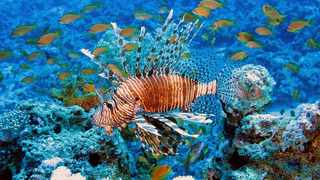A fish that can kill and cause harm to humans has been found in UK waters for the first time.
Lionfish is a colourful aquatic creature with 13 venomous spines. The fish can “deliver a venomous sting that can last for days” using the spines, explained the National Ocean Service. In humans the sting can cause “extreme pain, sweating, respiratory distress and even paralysis.” The intensity of the effects depends on an individual’s sensitivity to the toxins and how many spines have stabbed them.
In addition to their fearsome reputation, they are also an invasive species, meaning their presence has the potential to threaten entire ecosystem. Over the past fifteen years Lionfish have flourished in Atlantic Ocean, the Gulf of Mexico, and the Caribbean Sea, which are all far from their native range.
Lionfish are primarily carnivores and have few predators in this non-native areas. With the increase in their population, there is a rising concern among scientists that the species will pose a big threat to the ecosystem of the United Kingdom if they are allowed to thrive.
Arfon Summer, 39, caught the six-inch lionfish on Thursday at Chesil Beach in the south of England, the first in the region, reported The Independent.
Many are of the opinion that the lionfish may have travelled to Britain from as far as Italy, but it is possible that it could have been kept in an aquarium and dumped in the sea. If it has travelled all the way from the western Mediterranean, it will likely have huge consequences on native species.
“It is important to establish the circumstances of the catch, and to obtain the body if possible to establish which species of lionfish it is,” explained Dr. Oliver Crimmen, the Senior Curator of Fish at London’s Natural History Museum. He added: “If it arrived in the UK by itself from more southerly latitudes, this could be a bad news since it is such a potentially invasive species.”
Global warming and the rising water temperature could be the cause of spread in the species population.
“Anything caught in the Mediterranean can be found as a vagrant in the UK,” said Dr. Crimmen.
“The first instances of arm water fish from more southerly latitudes being found in the UK are a subject of a great interest, as they may represent populations moving northward in response to higher coastal water temperature.”

Comments
Post a Comment